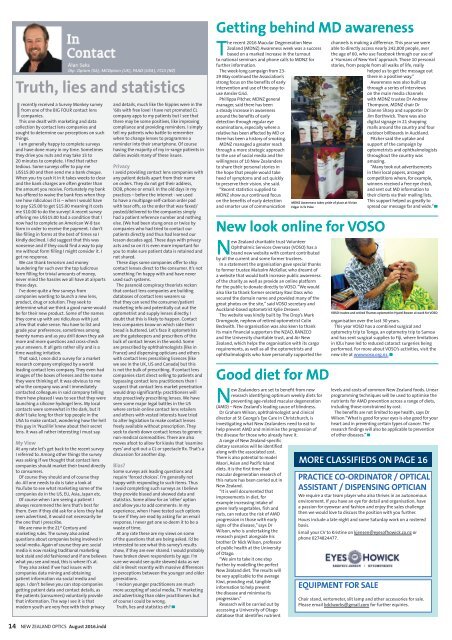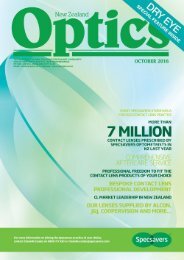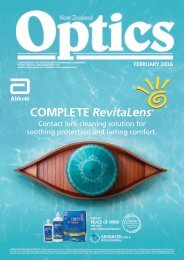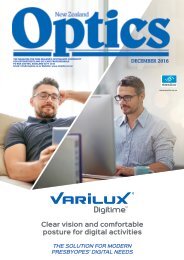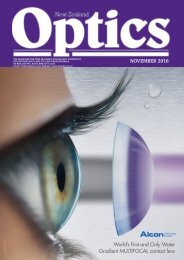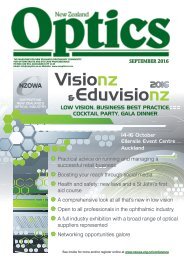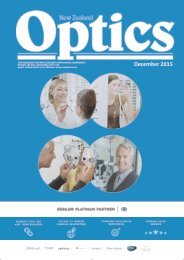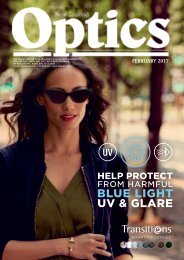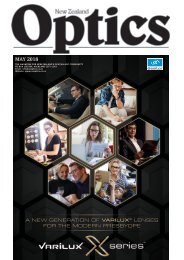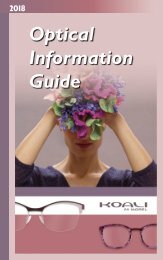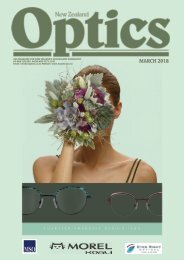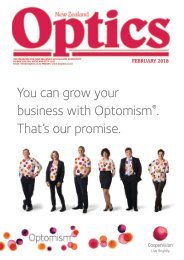You also want an ePaper? Increase the reach of your titles
YUMPU automatically turns print PDFs into web optimized ePapers that Google loves.
Truth, lies and statistics<br />
I<br />
recently received a Survey Monkey survey<br />
from one of the BIG FOUR contact lens<br />
companies.<br />
This one dealt with marketing and data<br />
collection by contact lens companies and<br />
sought to determine our perceptions on such<br />
things.<br />
I am generally happy to complete surveys<br />
and have done many in my time. Sometimes<br />
they drive you nuts and may take 15 to<br />
20 minutes to complete. I find that rather<br />
tedious. Some surveys offer to pay me<br />
US$15.00 and then send me a bank cheque.<br />
When you try cash it in it takes weeks to clear<br />
and the bank charges are often greater than<br />
the amount you receive. Fortunately my bank<br />
has offered to waive the bank fees when they<br />
see how ridiculous it is – when I would have<br />
to pay $25.00 to get $15.00 meaning it costs<br />
me $10.00 to do the survey! A recent survey<br />
offering me US$15.00 had a condition that I<br />
now had to complete an American W-8 tax<br />
form in order to receive the payment. I don’t<br />
like filling in forms at the best of times so I<br />
kindly declined. I did suggest that this was<br />
nonsense and if they could find a way to pay<br />
me without form filling I might consider it. I<br />
got no response.<br />
We can thank terrorism and money<br />
laundering for such over the top ludicrous<br />
form filling for trivial amounts of money,<br />
never mind the hassles we all have at airports<br />
these days.<br />
I’ve done quite a few surveys from<br />
companies wanting to launch a new lens,<br />
product, drug or solution. They seek to<br />
determine what we think a good name would<br />
be for their new product. Some of the names<br />
they come up with are ridiculous with just<br />
a few that make sense. You have to list and<br />
grade your preferences, sometimes among<br />
twenty names and as you drill down they ask<br />
more and more questions and cross-check<br />
your answers. It all gets rather silly and is a<br />
time wasting irritation.<br />
That said, I once did a survey for a market<br />
research company employed by a world<br />
leading contact lens company. They even had<br />
images of the boxes of lenses and the name<br />
they were thinking of. It was obvious to me<br />
who the company was and I immediately<br />
contacted colleagues in said company telling<br />
them how pleased I was to see that they were<br />
launching a silicone hydrogel lens. My local<br />
contacts were somewhat in the dark, but it<br />
didn’t take long for their top people in the<br />
USA to make contact, wondering how the hell<br />
this guy in ‘Nuzillin’ knew about their secret<br />
lens. It was all rather interesting I must say.<br />
My View<br />
At any rate let’s get back to the recent survey<br />
I referred to. Among other things the survey<br />
was asking if we thought that contact lens<br />
companies should market their brand directly<br />
to consumers.<br />
Of course they should and of course they<br />
do. All one needs to do is take a look at<br />
YouTube to see what marketing some of the<br />
companies do in the US, EU, Asia, Japan etc.<br />
Of course when I am seeing a patient I<br />
always recommend the lens that’s best for<br />
them. Even if they did ask for a lens they had<br />
seen advertised, it would not necessarily be<br />
the one that I prescribe.<br />
We are now in the 21 st Century and<br />
marketing rules. The survey also asked<br />
questions about companies being involved in<br />
social media. Again of course they are: social<br />
media is now making traditional marketing<br />
look staid and old fashioned and if one believes<br />
what you see and read, this is where it’s at.<br />
They also asked if we had issues with<br />
companies data mining and obtaining<br />
patient information via social media and<br />
apps. I don’t believe you can stop companies<br />
getting patient data and contact details, as<br />
the patients (consumers) voluntarily provide<br />
that information. The way I see it is that<br />
modern youth are very free with their privacy<br />
and details, much like the hippies were in the<br />
‘60s with free love! I have not promoted CL<br />
company apps to my patients but I see that<br />
there may be some positives, like improving<br />
compliance and providing reminders. I simply<br />
tell my patients who battle to remember<br />
when to change lenses to programme a<br />
reminder into their smartphone. Of course<br />
having the majority of my in-range patients in<br />
dailies avoids many of these issues.<br />
Privacy<br />
I avoid providing contact lens companies with<br />
any patient details apart from their name<br />
on orders. They do not get their address,<br />
DOB, phone or email. In the old days in my<br />
practices – before the internet - we used<br />
to have a multipage self-carbon order pad<br />
with tear offs, so the order that was faxed/<br />
posted/delivered to the companies simply<br />
had a patient reference number and nothing<br />
else. (We had been stung once or twice by<br />
companies who had tried to contact our<br />
patients directly and thus had learned our<br />
lesson decades ago). These days with privacy<br />
acts and so on it is even more important for<br />
you to make sure patient data is retained and<br />
not shared.<br />
These days some companies offer to ship<br />
contact lenses direct to the consumer. It’s not<br />
something I’m happy with and have never<br />
used such systems.<br />
The paranoid conspiracy theorists reckon<br />
that contact lens companies are building<br />
databases of contact lens wearers so<br />
that they can send the consumer/patient<br />
marketing info and potentially cut out the<br />
optometrist and supply lenses directly. I<br />
doubt that this is likely to happen. Contact<br />
lens companies know on which side their<br />
bread is buttered. Let’s face it optometrists<br />
are the gatekeepers and prescribers of the<br />
bulk of contact lenses in the world. Some<br />
are prescribed by ophthalmologists (like in<br />
France) and dispensing opticians and others<br />
with contact lens prescribing licences (like<br />
we see in the UK, US and Canada) but this<br />
is not the bulk of prescribing. If contact lens<br />
companies start direct selling to patients and<br />
bypassing contact lens practitioners then I<br />
suspect that contact lens market penetration<br />
would drop significantly: practitioners will<br />
stop proactively prescribing lenses. We have<br />
seen some major legal battles in the US<br />
where certain online contact lens retailers<br />
and others with vested interests have tried<br />
to alter legislation to make contact lenses<br />
freely available without prescription. They<br />
seek to dumb down contact lenses to generic<br />
non-medical commodities. There are also<br />
moves afoot to allow for kiosks that ‘examine<br />
eyes’ and spit out a CL or spectacle Rx. That’s a<br />
discussion for another day.<br />
Bias?<br />
Some surveys ask leading questions and<br />
require ‘forced choices’. I’m generally not<br />
happy with responding to such items. Thus<br />
I avoid completing such surveys as I believe<br />
they provide biased and skewed data and<br />
statistics. Some allow for an ‘other’ option<br />
and allow you to add comments: In my<br />
experience, when I have tested such options<br />
to see if they are read by asking for an email<br />
response, I never get one so deem it to be a<br />
waste of time.<br />
At any rate these are my views on some<br />
of the questions that are being asked. I’d be<br />
interested to see what this survey’s results<br />
show, if they are ever shared. I would probably<br />
have broken down respondents by age: I’m<br />
sure we would see quite skewed data as we<br />
did in Brexit recently with massive differences<br />
in perceptions between the younger and older<br />
generations.<br />
I reckon younger practitioners are much<br />
more accepting of social media, TV marketing<br />
and advertising than older practitioners but<br />
of course I could be wrong.<br />
Truth, lies and statistics eh? ▀<br />
Getting behind MD awareness<br />
The recent <strong>2016</strong> Macular Degeneration New<br />
Zealand (MDNZ) Awareness week was a success<br />
based on a marked increase in the turnout<br />
to national seminars and phone calls to MDNZ for<br />
further information.<br />
The week-long campaign from 23-<br />
29 May continued the Association’s<br />
strong focus on the benefits of early<br />
intervention and use of the easy-touse<br />
Amsler Grid.<br />
Phillippa Pitcher, MDNZ general<br />
manager, said there has been<br />
a steady increase in awareness<br />
around the benefits of early<br />
detection through regular eye<br />
examinations, especially where a<br />
relative has been affected by MD or<br />
there has been a history of smoking.<br />
MDNZ managed a greater reach<br />
through a more strategic approach<br />
to the use of social media and the<br />
willingness of 10 New Zealanders<br />
to share their personal stories in<br />
the hope that people would take<br />
heed of symptoms and act quickly<br />
to preserve their vision, she said.<br />
“Recent statistics supplied to<br />
MDNZ show our continued focus<br />
on the benefits of early detection<br />
and smarter use of communication<br />
Good diet for MD<br />
New Zealanders are set to benefit from new<br />
research identifying optimum weekly diets for<br />
preventing age-related macular degeneration<br />
(AMD) – New Zealand’s leading cause of blindness.<br />
Dr Graham Wilson, ophthalmologist and clinical<br />
director at St George’s Eye Care in Christchurch, is<br />
investigating what New Zealanders need to eat to<br />
help prevent AMD and minimise the progression of<br />
the disease for those who already have it.<br />
A range of New Zealand-specific<br />
dietary scenarios will be identified<br />
along with the associated cost.<br />
There is also potential to model<br />
Maori, Asian and Pacific Island<br />
diets. It is the first time that<br />
macular degeneration research of<br />
this nature has been carried out in<br />
New Zealand.<br />
“It is well documented that<br />
improvements in diet, for<br />
example increasing intake of<br />
green leafy vegetables, fish and<br />
nuts, can reduce the risk of AMD<br />
progression in those with early<br />
signs of the disease,” says Dr<br />
Wilson, who is undertaking the<br />
research project alongside his<br />
brother Dr Nick Wilson, professor<br />
of public health at the University<br />
of Otago.<br />
“We aim to take it one step<br />
further by modelling the perfect<br />
New Zealand diet. The results will<br />
be very applicable to the average<br />
Kiwi, providing real, tangible<br />
information to help prevent<br />
the disease and minimise its<br />
progression.”<br />
Research will be carried out by<br />
accessing a University of Otago<br />
database that identifies nutrient<br />
channels is making a difference. This year we were<br />
able to directly access nearly 242,000 people, over<br />
the age of 60, who use Facebook through our use of<br />
a ‘Humans of New York’ approach. Those 10 personal<br />
stories, from people from all walks of life, really<br />
helped us to get the message out<br />
there in a positive way.”<br />
Awareness was also built up<br />
through a series of interviews<br />
on the main media channels<br />
with MDNZ trustee Dr Andrew<br />
Thompson, MDNZ chair Dr<br />
Dianne Sharp and supporter Dr<br />
Jim Borthwick. There was also<br />
digital signage in 21 shopping<br />
malls around the country and four<br />
outdoor billboards in Auckland.<br />
Pitcher said the uptake and<br />
support of the campaign by<br />
optometrists and ophthalmologists<br />
throughout the country was<br />
amazing.<br />
“Many took out advertisements<br />
in their local papers, arranged<br />
competitions where, for example,<br />
winners received a free eye check,<br />
and sent out MD information to<br />
their clients via their mailing lists.<br />
New look online for VOSO<br />
New Zealand charitable trust Volunteer<br />
Ophthalmic Services Overseas (VOSO) has a<br />
brand new website with content contributed<br />
by all the current and some former trustees.<br />
In a statement the organisation gave special thanks<br />
to former trustee Malcolm McKellar, who dreamt of<br />
a website that would both increase public awareness<br />
of the charity as well as provide an online platform<br />
for the public to donate directly to VOSO. “We would<br />
also like to thank former secretary Ravi Dass who<br />
secured the domain name and provided many of the<br />
great photos on the site,” said VOSO secretary and<br />
Auckland-based optometrist Kylie Dreaver.<br />
The website was kindly built by The Drop’s Mark<br />
Dromgoole, nephew of retired optometrist Colin<br />
Beckwith. The organisation was also keen to thank<br />
its main financial supporters the NZAO, RANZCO<br />
and the University charitable trust, and Air New<br />
Zealand, which helps the organisation with its cargo<br />
requirements, as well as all the optometrists and<br />
ophthalmologists who have personally supported the<br />
MDNZ Awareness takes pride of place at Vivian<br />
Edgar in Te Puke<br />
This support helped us greatly to<br />
spread our message far and wide.” ▀<br />
VOSO trustee and retired Thames optometrist Hywel Bowen at work for VOSO<br />
organisation over the last 30 years.<br />
This year VOSO has a combined surgical and<br />
optometry trip to Tonga, an optometry trip to Samoa<br />
and has sent surgical supplies to Fiji, where limitations<br />
in IOLs have led to reduced cataract surgeries being<br />
performed. For more about VOSO’s activities, visit the<br />
new site at www.voso.org.nz. ▀<br />
levels and costs of common New Zealand foods. Linear<br />
programming techniques will be used to optimise the<br />
nutrients for AMD prevention across a range of diets,<br />
including those constrained by cost.<br />
The benefits are not limited to eye health, says Dr<br />
Wilson.“What is good for your eyes is also good for your<br />
heart and in preventing certain types of cancer. The<br />
research findings will also be applicable to prevention<br />
of other diseases.” ▀<br />
MORE CLASSIFIEDS ON PAGE 16<br />
PRACTICE CO-ORDINATOR / OPTICAL<br />
ASSISTANT / DISPENSING OPTICIAN<br />
We require a star team player who also thrives in an autonomous<br />
environment. If you have an eye for detail and organisation, have<br />
a passion for eyewear and fashion and enjoy the sales challenge<br />
then we would love to discuss the position with you further.<br />
Hours include a late night and some Saturday work on a rostered<br />
basis.<br />
Email your CV to Kristine on kjensen@eyesofhowick.co.nz or<br />
phone 0274824477.<br />
EQUIPMENT FOR SALE<br />
Chair stand, vertometer, slit lamp and other accessories for sale.<br />
Please email bdclworks@gmail.com for further equiries.<br />
14 NEW ZEALAND OPTICS <strong>Aug</strong>ust <strong>2016</strong>.indd


